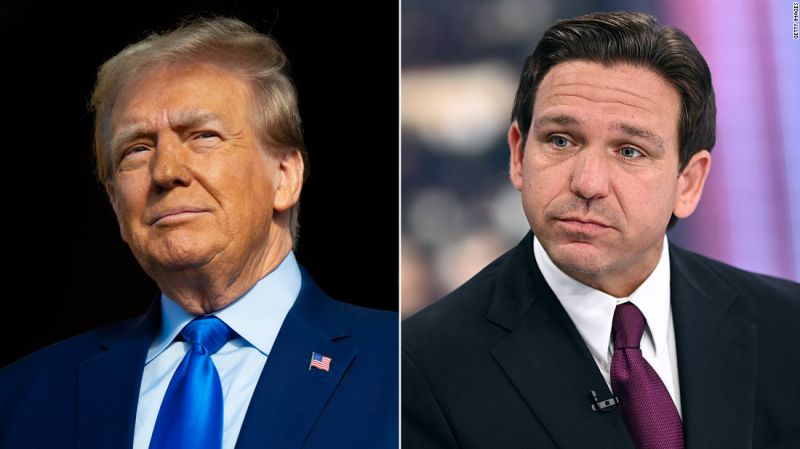After weeks spent locked in a bitter battle for second place, former South Carolina Gov. Nikki Haley and Florida Gov. Ron DeSantis will finally get the chance to grill one another in-person over the Israel-Hamas war, Ukraine’s war with Russia and China’s growing global influence during next week’s third primary debate in Miami.
The two have been previewing the attack lines they might deliver on the November 8 debate stage in interviews, stump speeches and ads as they seek to distinguish themselves as the Republican candidate who would be the best alternative to former President Donald Trump. DeSantis has accused Haley of having wanted to “roll out the red carpet” to China as governor in an effort to undercut her foreign policy bona fides, while Haley has painted the Florida governor’s increased attention on her as the desperate acts of a stalling campaign.
As the window to catch up to Trump closes, DeSantis and Haley have ratcheted up the tone and frequency of their attacks on one another. Wednesday’s event offers the pair, and the rest of the rapidly shrinking GOP field, one of their last chances to make their case at primetime before caucuses and primaries begin early next year.
The event, hosted by NBC News, Salem Radio Network and the Republican Jewish Coalition, will be the first time the remaining qualifying candidates get the chance to face off since Hamas’ deadly terror attack on October 7 and Israel’s retaliatory response. Foreign policy – and how Republican candidates view America’s role in the world – is expected to be a key focus of the debate.
That will likely benefit Haley, who has framed much of her campaign around the need for America to have a robust foreign policy at a time when the isolationist wing of the GOP has grown. The debate could also be a chance for the former United Nations ambassador, whose rise has been attributed in part to strong performances in the first two debates, to build on the momentum that has materialized in the form of new donors and bigger crowds.
“Nikki has gone into every debate telling voters exactly where she stands on supporting Israel, defeating Vladimir Putin, and standing up to China,” Haley campaign spokesperson Olivia Perez-Cubas said in a statement. “She is authentic and unapologetic.”
But the debate is also a chance for DeSantis to paint Haley as out of touch with a party that has shifted away from the neoconservatism of the Bush administration.
“Compare my record and then think about her record,” DeSantis said at a campaign event in Grimes, Iowa, on Friday night. “… Has she dug in when it’s tough and fought and won and delivered? No, it’s just not the way it is. It’s just a different flavor of leader.”
Hal Lambert, a GOP megadonor backing DeSantis, said that the Florida governor has argued that some politicians are more focused with the security of other countries’ borders than America’s borders.
“If you want to contrast with, say, Haley, I think her inclination is to immediately go as aggressive as possible from a war posture,” he said. “Gov. DeSantis is much more restrained.”
Both candidates are running out of time to make their case. New Hampshire Gov. Chris Sununu, who has appeared alongside both DeSantis and Haley over the past week, said the rising momentum for Haley is palpable among Republican primary voters. He said the Miami debate on Wednesday could be a critical moment in the race.
“You’re going to have maybe half as many candidates on that stage as you did the first time, which means they’re going to have at least twice as much time. You can’t just say the same thing you said in the first and second debate, you’ve got to come up with something a little bit new,” Sununu told CNN. “The third debate is going to be one of the more challenging, but also an opportunity for both candidates.”
Ahead of the debate, DeSantis and Never Back Down, the super PAC supporting him, have previewed a number of attacks designed to call her foreign policy judgment into question.
Salem Radio Network’s Hugh Hewitt, one of the moderators of the upcoming debate, said during an interview with DeSantis Monday that he saw two major policy differences between the Florida governor and the former UN ambassador: DeSantis’ support and Haley’s opposition to Alabama Sen. Tommy Tuberville’s blockade of military promotions over a Defense Department’s abortion policy and his reluctance to increase aid to Ukraine.
“I don’t think those are the only two,” DeSantis said.
DeSantis and his allies are focusing on her work bringing in Chinese investment to South Carolina during her time as governor from January 2011 to January 2017, specifically her recruitment of China Jushi, a fiberglass company that was gifted 200 acres of land in the state. The 2016 deal was expected to create 400 jobs in the state, according to the South Carolina Department of Commerce.
“It’s a difference between record and rhetoric,” DeSantis told CNN Friday while campaigning in Iowa. “She’s trying to go a different direction on her rhetoric when it comes to China, but her record is writing the Chinese ambassador love letters saying, like, how great a friend China is. No, they’re not a friend. They are an adversary.”
DeSantis has pointed to a law he signed in May that prohibits China and restricts “other foreign countries of concern” from purchasing farmland and land within 10 miles of military installations or any type of “critical infrastructure,” including seaports, airports, powerplants, space ports, chemical manufacturing and telecom systems.
“Ron DeSantis uniquely recognizes the threat posed by the Chinese Communist Party and spent his governorship working to end pre-existing state ties with China and build up protections against future Chinese incursions,” DeSantis press secretary Bryan Griffin said. “Nikki Haley spent her governorship courting Chinese businesses to South Carolina, calling them a friend, and failing to pursue corrective efforts to safeguard her state from the threat of the CCP.”
Never Back Down has released two ads in the last two weeks on the issue. “Gov. Nikki Haley helped the Chinese company set up shop five miles from our base, on land she gave them, where they fly China’s flag, serve China’s interests,” one of the ad says, calling Haley “too dangerous to lead.”
Haley has also faced questions about the deal on the campaign trail. During an October 9 town hall in Boone, Iowa, she was asked whether she gave away the land. She deflected, telling the audience her state didn’t “sell” any land to China. The Washington Post called her response “misleading” in a fact check. Two days after the fact check ran, she was asked by a voter in Cedar Rapids, Iowa, why she “didn’t tell the truth” about the land donation.
“What I will tell you is there is not another governor in this race that hasn’t worked to recruit Chinese companies, Ron DeSantis included,” she said in response.
Haley said that she acted then to bring jobs to the state. Now the US has a better understanding of China’s actions.
“You can talk about anything I did 10 years ago, that’s fine,” she said. “But what I’m talking to you about now is how we deal with it today, because that’s what matters.”
Haley has called China an “enemy” and America’s greatest national security threat. Earlier this year, she laid out how she would take a more aggressive approach to China than either Trump or Biden, by encouraging Congress to end trade relations with the country until there’s less fentanyl coming into the US and blocking federal funding for American universities that take money from the Chinese government.
Chip Felkel, a South Carolina-based Republican strategist who isn’t attached to any campaigns, said he didn’t think the attack would land with everyday voters, especially in the Palmetto State.
“Is that a sore spot? It depends on how she reacts,” Felkel said. “I mean, tell that to the people in the communities around the state where they’ve benefited from Chinese investment.”
The debate over China policy isn’t the first time Haley and DeSantis have clashed.
As the war between Israel and Hamas has continued, DeSantis said that Haley wanted to take in refugees from Gaza, a claim deemed false by a CNN fact check. SFA Fund, the super PAC backing Haley, responded to back-and-forth over refugees and other attacks in a recent ad that accused him of smearing Haley.
“He’s lying because he’s losing,” the ad says.
Earlier this year, as DeSantis feuded with Disney over the company’s opposition to legislation – dubbed “Don’t Say Gay” by its opponents – to limit sex and gender education in schools, Haley invited the company to bring its jobs and investments to South Carolina.
During the second debate, Haley attacked DeSantis over his opposition to fracking and offshore drilling in Florida. As a gubernatorial candidate, DeSantis campaigned on protecting Florida’s coastlines, a key driver of tourism, and voters there passed a measure to ban offshore drilling. He’s said that he supports fracking and drilling in states that allow it.
These policy feuds have taken on a new level of urgency and aggression as Haley has risen in the polls. The third debate comes at a crucial time in the primary process, as the Republican field has started to winnow and fewer candidates are expected on the debate stage.
A Des Moines Register/NBC/Mediacom poll released Monday showed Haley with 16% support, up 10 percentage points from August and tied with DeSantis for second.
DeSantis allies argue there’s good news for DeSantis in the Iowa poll – he’s the most popular second choice for both Trump and Haley supporters; 41% of Trump supporters and 34% of Haley supporters named DeSantis as their second choice.
At the same time, the poll showed Haley gaining strength with multiple demographics, including independents. And a CNN poll of South Carolina GOP voters showed Haley in second with 22% support in her home state to 11% for DeSantis.
Trump still widely led both polls, with 43% in Iowa and 53% in South Carolina. But at a time when DeSantis has been insisting that this is a two-man race, Haley has argued that she is actually the leading candidate to take on Trump.
“I am now in second place in Iowa. Second place in New Hampshire. Second place in South Carolina,” Haley said Monday as she filed for the South Carolina primary. “I got one more fellow I got to catch up to you and I am determined to get started.”
CNN’s Jeff Zeleny and Steve Contorno contributed to this report.
Read the full article here



